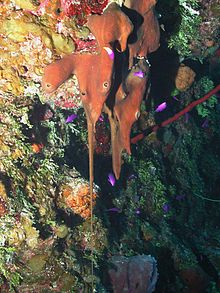Plakortis is a genus of marine sponges in the order Homosclerophorida,[1] first described by Franz Eilhard Schulze in 1880.[1][2]
| Plakortis | |
|---|---|

| |
| An unidentified Plakortis species | |
| Scientific classification | |
| Domain: | Eukaryota |
| Kingdom: | Animalia |
| Phylum: | Porifera |
| Class: | Homoscleromorpha |
| Order: | Homosclerophorida |
| Family: | Plakinidae |
| Genus: | Plakortis Schulze, 1880 |
| Type species | |
| Plakortis simplex Schulze, 1880
| |
| Synonyms[1] | |
|
Placortis (misspelling) | |
Description
editPlakortis sponges are characterised by having:[3]
- inorganic (spicular) skeletal complement
- Skeleton composed mainly of diods, triods, and/or calthrops in one size class
- Lophose diods, triods, or calthrops complement the main skeleton of non-lophose spicules
- no lophose spicules
- diactinal "microscleres" (microrhabs) in some species
Species
editList of accepted species:[1]
- Plakortis albicans Cruz-Barraza & Carballo, 2005
- Plakortis angulospiculatus (Carter, 1879)
- Plakortis badabaluensis Ubare & Mohan, 2016
- Plakortis bergquistae Muricy, 2011
- Plakortis clarionensis Cruz-Barraza, Vega & Carballo, 2014
- Plakortis communis Muricy, 2011
- Plakortis copiosa Pulitzer-Finali, 1993
- Plakortis dariae Ereskovsky, Lavrov & Willenz, 2014
- Plakortis deweerdtaephila Vicente, Zea & Hill, 2016
- Plakortis edwardsi Ereskovsky, Lavrov & Willenz, 2014
- Plakortis erythraena Lévi, 1958
- Plakortis fromontae Muricy, 2011
- Plakortis galapagensis Desqueyroux-Faúndez & van Soest, 1997
- Plakortis halichondrioides (Wilson, 1902)
- Plakortis hooperi Muricy, 2011
- Plakortis insularis Moraes & Muricy, 2003
- Plakortis japonica (Hoshino, 1977)
- Plakortis kenyensis Pulitzer-Finali, 1993
- Plakortis lita de Laubenfels, 1954
- Plakortis mesophotica Idan, Shefer, Feldstein & Ilan, 2021
- Plakortis microrhabdifera Moraes & Muricy, 2003
- Plakortis myrae Ereskovsky, Lavrov & Willenz, 2014
- Plakortis nigra Lévi, 1953
- Plakortis petrupaulensis Domingos, Moraes & Muricy, 2013
- Plakortis potiguarensis Domingos, Moraes & Muricy, 2013
- Plakortis pulvillus Samaai, Pillay & Janson, 2019
- Plakortis quasiamphiaster Díaz & van Soest, 1994
- Plakortis ruetzleri Lage, Muricy, Ruiz & Pérez, 2018
- Plakortis simplex Schulze, 1880
- Plakortis spinalis Domingos, Moraes & Muricy, 2013
- Plakortis symbiotica Vicente, Zea & Hill, 2016
- Plakortis zyggompha (de Laubenfels, 1934)
Literature
editChemical and medecinal properties
edit- Paul Ralifo; Laura Sanchez; Nadine C Gassner; Karen Tenney; R Scott Lokey; Theodore R Holman; Frederick A Valeriote; Phillip Crews (1 January 2007). "Pyrroloacridine alkaloids from Plakortis quasiamphiaster: structures and bioactivity". Journal of Natural Products. 70 (1): 95–99. doi:10.1021/NP060585W. ISSN 0163-3864. PMC 1839848. PMID 17253856. Wikidata Q42875300.
- Sridevi Ankisetty; Deborah J. Gochfeld; M. Cristina Diaz; Shabana I. Khan; Marc Slattery (25 August 2010). "Chemical constituents of the deep reef caribbean sponges Plakortis angulospiculatus and Plakortis halichondrioides and their anti-inflammatory activities". Journal of Natural Products. 73 (9): 1494–1498. doi:10.1021/NP100233D. ISSN 0163-3864. PMID 20738102. Wikidata Q84803121.
- Florecita S. De Guzman; Francis J. Schmitz (July 1990). "Peroxy Aliphatic Esters from the Sponge Plakortis lita". Journal of Natural Products. 53 (4): 926–931. doi:10.1021/NP50070A021. ISSN 0163-3864. Wikidata Q104397018.
- Braekman JC; Daloze D; De Groote S; Fernandes JB; Van Soest RW (3 July 1998). "New polyketides from the sponge Plakortis sp". Journal of Natural Products. 61 (8): 1038–1042. doi:10.1021/NP980096Z. ISSN 0163-3864. PMID 9722495. Wikidata Q77171802.
- A Rudi; Y Kashman (October 1993). "Three new cytotoxic metabolites from the marine sponge Plakortis halichondrioides". Journal of Natural Products. 56 (10): 1827–1830. doi:10.1021/NP50100A027. ISSN 0163-3864. PMID 8277322. Wikidata Q72696133.
References
edit- ^ a b c d Van Soest RW, Boury-Esnault N, Hooper JN, Rützler K, de Voogd NJ, de Glasby BA, Hajdu E, Pisera AB, Manconi R, Schoenberg C, Janussen D, Tabachnick KR, Klautau M, Picton B, Kelly M, Vacelet J (eds.). "Plakortis Schulze, 1880". World Porifera database. World Register of Marine Species. Retrieved 2022-02-23.
- ^ Schulze, F.E. (1880). "Untersuchungen über den Bau und die Entwicklung der Spongien. Neunte Mittheilung. Die Plakiniden". Zeitschrift für wissenschaftliche Zoologie. 34 (2): 407-451 [449].
- ^ "Australian Faunal Directory: Plakinidae". biodiversity.org.au. Retrieved 2022-02-23.